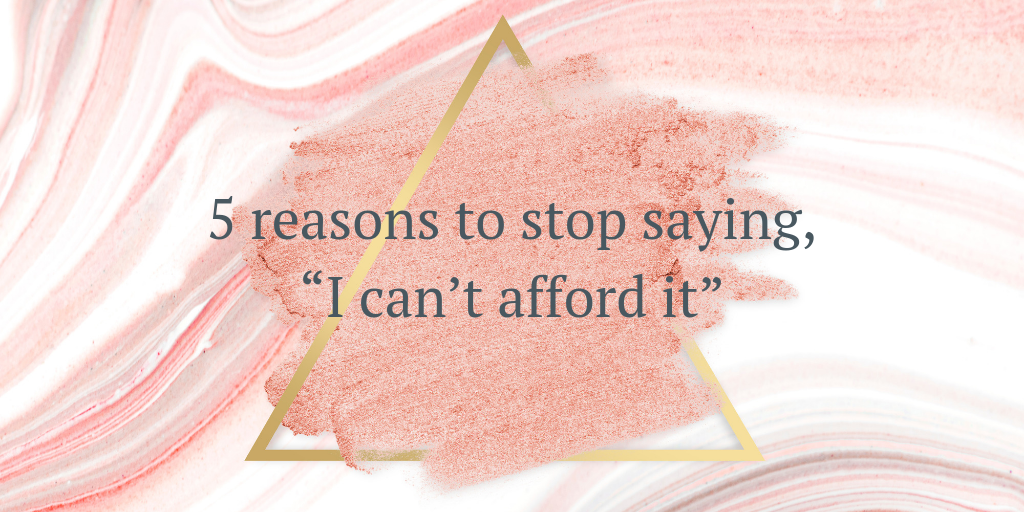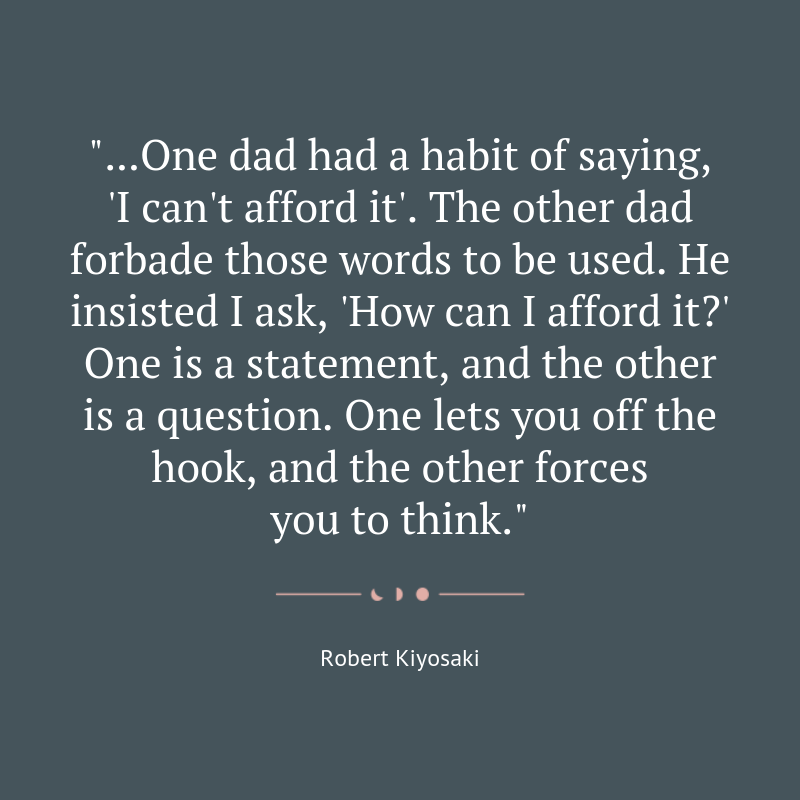
Background photo created by rawpixel.com – www.freepik.com
Can you think of a time when you thought or said, “I can’t afford it”?
I heard my parents say it many times during my childhood. Now, I never had any anxiety about my parents’ ability to afford food, utilities, a home or many other things. But because there were no universities near where we lived, I worried that living away from home to attend university would be far out of my parents’ reach so I didn’t even consider it after leaving school. However, I’m grateful that I did eventually achieve a university qualification as a mature-aged student.
We also use this throw-away statement to ourselves, our kids, our friends and our family to avoid saying what we really mean. I used to use it as an excuse when I didn’t want to do something where a simple “no thank you” would have been a better response.
Here are five good reasons to stop.
1. Closes you off to solutions
Saying or thinking, “I can’t afford it” shuts down the brain and closes the door on opportunities to find a way when you thought there was none. It becomes a reflex response and is a limiting belief that puts you as a victim of money. You’ll look for (and always find) evidence to support your thinking.
2. Creates a negative vibration
It’s true that if you think you can (or you can’t) you’re right because thoughts become things. Saying, “I can’t afford it” evokes feelings of helplessness and sadness. It gives away your power and puts you in a negative vibration which repels abundance.
3. Sends the wrong message to your children
Kids see all the ways their family spends (or wastes) money. If you say, “I can’t afford it” to you kids they may worry that there’s never enough money and feel insecure. When you blame parenting choices on affordability instead of priority you are fostering a scarcity mindset in your children.
4. Puts you into a comparison mentality
When you look at what other people are spending their money on and think, “Oh, we could never afford that”, comparisonitis has reared its ugly head. Comparisonitis will cause you to want bigger, and better things. It makes you focus your attention on what you don’t have and leaves you feeling inadequate, unappreciative and unhappy with your life.
5. Rich people don’t say it
Robert Kiyosaki writes in the personal finance classic, “Rich Dad Poor Dad” that his rich dad never used this throw-away statement.

What to say instead
I don’t say “I can’t afford that” because it’s not true. I can afford it, I just prefer to spend my money elsewhere or I’m not willing to go into debt to have it. It’s not about being able to afford something, or not. It’s really about choosing your priorities and owning them. If you don’t want to spend the money, don’t have a problem saying so.
When it’s something you truly want to do or have:
How can I afford it?
What could I do to make it affordable?
These questions will get you thinking about the possibilities for making it happen.
When you’re clear on your priorities:
It’s not a priority for me right now.
I’d rather have [this] than [that].
That’s not how I choose to spend my money.
It’s not in my spending plan/budget at the moment.
These statements come from a place of knowing what you really want and may even cause you to re-evaluate your choices.
When your child asks you to spend money:
That’s not something I’m going to spend money on. Do you want to spend your allowance?
I’m choosing not to spend money on extra activities right now.
No, right now we’re saving our fun money for [a family holiday/Christmas, etc.].
No, I won’t buy you a [desirable item] because we don’t want this item in our home.
No, $xx is a lot to pay for [desirable item]. If we watch the sales we can probably find the same for less money.
No, I will not spend $xx on [desirable item]. Period.
When we go to the supermarket, we’re only going to buy what’s on the list.
Instead of the offhand response, “we can’t afford it”, it’s better to give an honest answer. This forces you to think about and explain to your child why the purchase they are suggesting is not going to happen. It’s good for you and good for the kids.
How to know what you want
If you just drift aimlessly through life, buying every shiny object that catches your eye and growing your debt, how will you ever save up enough money for a new car, a family holiday or a home deposit?
A spending plan is the best way to be certain of your priorities and how you want your money to work for you. It will help your entire family focus on common goals and ensure that you will always have enough money for the essentials as well as the other things that are important to you.
If you want to have control over your money and be more intentional about the way you spend and save, a spending plan is the answer and I’d love to help you create yours. You can find out more about spending plans vs budgets in this blog post.
If need help in looking beyond the numbers and focusing on the why behind the numbers, book in for an obligation-free chat with me here.

